| Princess Marina | |
|---|---|
| Duchess of Kent (more) | |
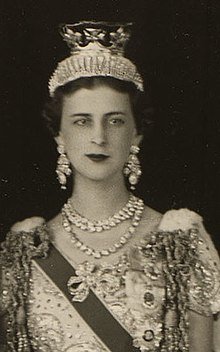 Marina at the coronation of George VI in 1937 Marina at the coronation of George VI in 1937 | |
| Born | (1906-12-13)13 December 1906 Athens, Greece |
| Died | 27 August 1968(1968-08-27) (aged 61) Kensington Palace, London, United Kingdom |
| Burial | 30 August 1968 Royal Burial Ground, Frogmore |
| Spouse |
Prince George, Duke of Kent
(m. 1934; died 1942) |
| Issue | |
| House | Glücksburg |
| Father | Prince Nicholas of Greece and Denmark |
| Mother | Grand Duchess Elena Vladimirovna of Russia |
| Signature | |
Princess Marina, Duchess of Kent (born Princess Marina of Greece and Denmark, Greek: Μαρίνα; 13 December [O.S. 30 November] 1906 – 27 August 1968) was a Greek and Danish princess by birth and a British princess by marriage. She was a daughter of Prince Nicholas of Greece and Denmark and Grand Duchess Elena Vladimirovna of Russia, and a granddaughter of King George I and Queen Olga of Greece. Princess Marina married Prince George, Duke of Kent, fourth son of King George V and Queen Mary, in 1934. They had three children: Prince Edward, Princess Alexandra, and Prince Michael.
Marina was widowed in 1942, when her husband was killed in a plane crash on active service. In later life she carried out many royal engagements, including the independence celebrations for Ghana and Botswana.
Early life
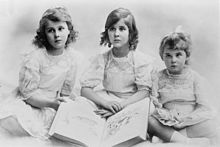
Princess Marina was born on 13 December 1906 in Athens, Greece, during the reign of her paternal grandfather, George I of Greece. She was the third and youngest daughter of Prince Nicholas of Greece and Denmark, and his wife Grand Duchess Elena Vladimirovna of Russia. Her father was the third son of George I of Greece and Queen Olga, while her mother was the only daughter of Grand Duke Vladimir Alexandrovich and Grand Duchess Maria Pavlovna of Russia. Her father was a grandson of Christian IX of Denmark, while her mother was a granddaughter of Emperor Alexander II of Russia.
Princess Marina had two elder sisters, Princess Olga and Princess Elizabeth. Princess Olga married Prince Paul of Yugoslavia in 1923. After the assassination of his cousin, Alexander I of Yugoslavia, Paul served as Prince Regent of Yugoslavia from 1934 to 1941. Princess Elizabeth married Carl Theodor, Count of Toeering-Jettenbach in 1934. One of their paternal uncles was Prince Andrew of Greece and Denmark, the father of Prince Philip, Duke of Edinburgh (making Marina and her sisters Philip's first cousins).
Marina spent her early years in Greece, and lived with her parents and paternal grandparents at Tatoi Palace. Along with her sisters, she was raised to be devout and religious, which was encouraged by her grandmother, Queen Olga of Greece. Marina's family travelled outside of Greece often, especially during the summer months. Her first recorded visit to Britain was in 1910, when she was 3, after the death of her godfather, Edward VII. During that visit, she met her other godmother and future mother-in-law, Queen Mary, who treated Marina and her sisters like her own children.
The Greek royal family was forced into exile when Marina was 11, following the overthrow of the Greek monarchy. They later moved to Paris, while the Princess stayed with her extended family throughout Europe.
Marriage and children
Wedding ceremony
Further information: Wedding of Prince George and Princess Marina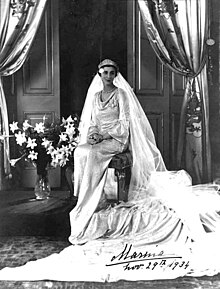
In 1932, Princess Marina and Prince George (later the Duke of Kent), a second cousin through Christian IX of Denmark, met in London. Their betrothal was announced in August 1934. Prince George was created Duke of Kent on 9 October 1934. On 29 November 1934, they married at Westminster Abbey, London. The wedding was a grand affair, as it had been more than eleven years since the last royal wedding with Prince Albert, Duke of York, and Lady Elizabeth Bowes-Lyon (later King George VI and Queen Elizabeth The Queen Mother). The wedding of Prince George and Princess Marina was the first royal wedding ceremony to be broadcast by wireless, and with the use of other technology, such as microphones—the control room was located underneath the Unknown Warrior's tomb of Westminster Abbey. The service was broadcast locally and abroad to other nations, and loudspeakers allowed spectators from outside the Abbey to hear the proceedings. The wedding was followed by a Greek ceremony in the private chapel at Buckingham Palace, which was converted into an Orthodox chapel for the ceremony. The wedding was the most recent occasion on which a princess from another royal family married into the British royal family.
Married life

The Duke and Duchess set up their first home at 3 Belgrave Square, close to Buckingham Palace. She became a patroness of several organizations and charities, including the Elizabeth Garrett Anderson Hospital, the Women's Hospital Fund, and the Central School of Speech and Drama. She would continue to support these charities and institutions for the rest of her life. She became very close to her mother-in-law, Queen Mary, with whom she would usually spend time while her husband was off performing his own royal duties.
The couple had three children:
- Prince Edward, Duke of Kent (born 9 October 1935). He married Katharine Worsley on 8 June 1961. They have three children.
- Princess Alexandra, The Honourable Lady Ogilvy (born 25 December 1936). She married the Hon. Angus Ogilvy, son of David Ogilvy, 12th Earl of Airlie and Lady Alexandra Coke, on 24 April 1963. They have two children.
- Prince Michael of Kent (born 4 July 1942). He married Baroness Marie Christine von Reibnitz on 30 June 1978. They have two children.
The Duke of Kent was killed on 25 August 1942, in an airplane crash at Eagle's Rock, near Dunbeath, Caithness, Scotland, while on active service with the Royal Air Force. The Duchess, according to royal biographer Hugo Vickers, was "the only war widow in Britain whose estate was forced to pay death duties".
During World War II, Marina was trained as a nurse for three months under the pseudonym "Sister Kay" and joined the civil nurse reserve.
Later life and death
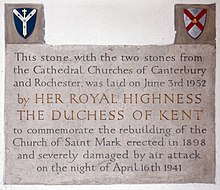
After her husband's death, the Duchess of Kent continued to be an active member of the British royal family, carrying out a wide range of royal and official engagements. She was the president of the Wimbledon All England Lawn Tennis and Croquet Club for 26 years. She was also the president of the Royal National Lifeboat Institution from 1943 until her death and was awarded the RNLI's gold medal in 1967 to mark this contribution. One of her first cousins was Prince Philip (later the Duke of Edinburgh), who married her niece, the future Queen Elizabeth II, in 1947.
In 1947, Princess Marina visited Greece and Italy. In June 1952 the Duchess laid the foundation stone of the new St Mark's Church in Bromley, London, which had been damaged in the war.
In 1952, the Duchess also visited Sarawak (then a British Crown Colony), where she laid the foundation stone of the Cathedral of St Thomas in Kuching. She also visited the Batu Lintang camp, a Japanese internment camp during World War II which had been converted to a teacher training college, and the city of Sibu, where she opened the outpatient department of the Lau Kheng Howe Hospital.
In March 1957, when the Gold Coast achieved independence from Britain as Ghana, the Duchess of Kent was appointed to represent the Queen at the celebrations. Fifty years later, at the 50th anniversary of Ghana's independence, her son, Prince Edward, Duke of Kent, was appointed by the Queen to represent her.
Marina earned a place in the International Best Dressed List Hall of Fame in 1960 together with the Princess of Monaco, Patricia Lopez-Willshaw and Merle Oberon. In 1964, the Princess took an extensive tour of Australia and officially opened Gladesville Bridge in Sydney.
In September and October 1966, when the British Protectorates of Bechuanaland and Basutoland became the new Republic of Botswana and the Kingdom of Lesotho respectively, the Princess was appointed again to represent the Queen at both celebrations. The main public hospital in Gaborone, the new Botswana's capital, is named "Princess Marina Hospital". She was the Chancellor of the University of Kent at Canterbury from 1963 until her death.
Princess Marina, Duchess of Kent, died of a brain tumour at Kensington Palace at 11.40 am on 27 August 1968, aged 61. The funeral service for the Princess was held at St. George's Chapel on 30 August. She was buried in the Royal Burial Ground, Frogmore. Her funeral was the last royal ceremony attended by her brother-in-law, the former king Edward VIII. Her will was sealed in London after her death in 1968. Her estate was valued at £76,166 (or £940,600 in 2022 when adjusted for inflation).
Legacy
Princess Marina gave her name to many facilities, including:
- Princess Marina College, Arborfield, Berkshire
- Princess Marina House, a facility of the Royal Air Force Benevolent Fund at Rustington.
- Princess Marina Hospital, Upton, Northamptonshire
- Princess Marina Hospital, Gaborone, Botswana
- Princess Marina Sports Complex, Rickmansworth.
- Duchess of Kent Hospital, Sandakan, Sabah, Malaysia
References in popular culture
- The Kinks recorded "She's Bought a Hat Like Princess Marina" for their 1969 album Arthur (or the Decline and Fall of the British Empire). The song was written by Ray Davies.
- In 2017, Clare Holman portrayed Princess Marina in the season 2 finale of The Crown.
Titles, styles, honours, and arms
Titles and styles
Marina was known as the Princess Marina of Greece. Upon marriage she became known as Her Royal Highness The Duchess of Kent, and was later titled Her Royal Highness The Princess Marina, Duchess of Kent.
Honours
Commonwealth
- GCStJ: Dame Grand Cross of the Order of St. John of Jerusalem, 1935
- CI: Companion of the Order of the Crown of India, 1937
- GBE: Dame Grand Cross of the Order of the British Empire, 1937
- GCVO: Dame Grand Cross of the Royal Victorian Order, 1948
- Recipient of the Queen Elizabeth II Coronation Medal
- Royal Family Order of King George V
- Royal Family Order of King George VI
- Royal Family Order of Queen Elizabeth II
Foreign
Dynastic
 House of Romanov: Dame Grand Cordon of the Imperial Order of Saint Catherine
House of Romanov: Dame Grand Cordon of the Imperial Order of Saint Catherine Kingdom of Greece: Dame Grand Cross of the Royal Family Order of Saints Olga and Sophia
Kingdom of Greece: Dame Grand Cross of the Royal Family Order of Saints Olga and Sophia
Honorary military appointments
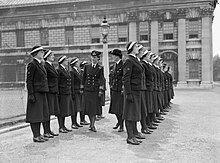
- Canada
 Colonel-in-Chief, The Essex and Kent Scottish (1942 – 1968)
Colonel-in-Chief, The Essex and Kent Scottish (1942 – 1968)
- United Kingdom
 Colonel-in-Chief, of The Queen's Own Royal West Kent Regiment
Colonel-in-Chief, of The Queen's Own Royal West Kent Regiment Colonel-in-Chief, of the Royal Electrical and Mechanical Engineers
Colonel-in-Chief, of the Royal Electrical and Mechanical Engineers Honorary Colonel, of the Buckinghamshire Battalion, The Oxfordshire and Buckinghamshire Light Infantry
Honorary Colonel, of the Buckinghamshire Battalion, The Oxfordshire and Buckinghamshire Light Infantry Honorary Colonel, of the Buckinghamshire Regiment, RA (Territorials)
Honorary Colonel, of the Buckinghamshire Regiment, RA (Territorials) Commandant, Women's Royal Naval Service (1940–1968) (Chief Commandant from 1951)
Commandant, Women's Royal Naval Service (1940–1968) (Chief Commandant from 1951)
Arms

|

|
|---|---|
| Coat of arms of Princess Marina, Duchess of Kent | Royal monogram of Princess Marina, Duchess of Kent |
Ancestry
See also: Descendants of Christian IX of Denmark| Ancestors of Princess Marina of Greece and Denmark |
|---|
See also
References
- ^ "Marina won Britain's heart". Evening Times. 27 August 1968. Retrieved 17 July 2013.
- ^ "Marina, a tragic but well-loved Princess". The Sydney Morning Herald. London. 28 August 1968. Retrieved 24 July 2013.
- ^ "Prince George son of King, to be married". The Montreal Gazette. London. CP and AP. 28 August 1934. Retrieved 24 July 2013.
- ^ "Princess Marina called luckiest girl in the world by relatives". The Milwaukee Journal. Athens. Associated Press. 23 November 1934. Retrieved 24 July 2013.
- Montgomery-Massingberd, Hugh, ed. (1977). Burke's Royal Families of the World. Vol. 1: Europe & Latin America. London: Burke's Peerage Ltd. p. 326. ISBN 0-85011-023-8.
- King, pg. 37
- King, pg. 39
- "No. 34094". The London Gazette. 9 October 1934. p. 6365.
- ^ "King and Queen see rehearsals". The Sydney Morning Herald. 29 November 1934. Retrieved 24 July 2013.
- King, pg. 125
- King, pg. 136.
- King, pg. 143
- King, pg. 144
- Hugo Vickers, Elizabeth, The Queen Mother, Hutchinson, 2005, p. 230
- Hennessy, Sue (2010). Hidden Depths: Women of the RNLI. The History Press. pp. 140–1. ISBN 9780752454436.
- "Duchess Of Kent In Greece (1947)". British Pathé. YouTube. 13 April 2014. Archived from the original on 17 November 2021. Retrieved 25 March 2018.
- "The Duchess Of Kent Visits Italy (1947)". British Pathé. YouTube. 13 April 2014. Archived from the original on 17 November 2021. Retrieved 25 March 2018.
- Robin Waldron. "St Mark's History" (PDF) (2011 ed.). St Mark's Church Bromley. Archived from the original (PDF) on 13 July 2014. Retrieved 6 April 2015.
- Sarawak Gazette 1952
- "Birth Of A New State (1957)". British Pathé. YouTube. 13 April 2014. Archived from the original on 17 November 2021. Retrieved 21 November 2020.
- "Duke of Kent unveils plaque for military project". Ghana Armed Forces. Ghana Web. 7 March 2007. Retrieved 25 March 2018.
- Zilkha, Bettina (2004). Ultimate Style - The Best of the Best Dressed List. Assouline. ISBN 2-84323-513-8.
- "Princess Marina's Visit To Australia AKA Princess Marina In Australia (1964)". British Pathé. YouTube. 13 April 2014. Archived from the original on 17 November 2021. Retrieved 25 March 2018.
- Luscombe, Stephen. "The British Empire, Imperialism, Colonialism, Colonies". www.britishempire.co.uk. Retrieved 25 June 2017.
- Debrett's Peerage and Baronetage. Kelly's Directories. 2000. ISBN 978-0-333-54577-5.
- "Five Queens at funeral of Duchess". The Windsor Star. Windsor. Reuters. 31 August 1968. Retrieved 24 July 2013.
- "1968: Princess Marina laid to rest". BBC News. 30 August 1976. Retrieved 15 June 2013.
- Ziegler, Philip (1991). King Edward VIII: The official biography. New York: Alfred A. Knopf. ISBN 0-394-57730-2, pp. 554-556.
- Evans, Rob; Pegg, David (18 July 2022). "£187m of Windsor family wealth hidden in secret royal wills". The Guardian. Retrieved 19 July 2022.
- "Royal Air Force Benevolent Fund". About Princess Marina House. Archived from the original on 17 February 2013. Retrieved 15 June 2013.
- "Overview - NHS Choices". Princess Marina Hospital. 10 August 2010. Retrieved 17 July 2013.
- "Princess Marina Sports Complex". We Love Rickmansworth. Archived from the original on 8 January 2009. Retrieved 9 April 2012.
- ^ "She Bought A Hat Like Princess Marina". The Kinks. Retrieved 24 July 2013.
- "No. 34103". The London Gazette. 9 November 1934. p. 7155.
- ^ "No. 34174". The London Gazette. 25 June 1935. p. 4084.
- ^ "No. 38161". The London Gazette (Supplement). 30 December 1947. p. 9.
- ^ "No. 43141". The London Gazette (Supplement). 22 October 1963. p. 8761.
- "Viewing Page 3729 of Issue 34406". London Gazette. 8 June 1937. Retrieved 9 April 2012.
- "No. 40020". The London Gazette (Supplement). 20 November 1953. p. 6225.
- ^ Vickers, Hugo (1994). Royal Orders. Boxtree. p. 147. ISBN 9781852835101.
- Risk, James (2001). Royal Service Volume II (first ed.). London: Third Millennium. pp. 13–46. ISBN 1903942047.
- "Reply to a parliamentary question" (PDF) (in German). p. 214. Retrieved 18 October 2012.
- "SAINTANNA.RU - Св. Екатерины". saintanna.ru. Archived from the original on 13 March 2012. Retrieved 25 June 2017.
- The Essex and Kent Scottish, Key Appointments, The Scottish Borderers Foundation, retrieved 15 November 2023
- "London Honours Duchess Aka City Honours Duchess Of Kent (1952)". British Pathé. YouTube. 13 April 2014. Archived from the original on 17 November 2021. Retrieved 25 March 2018.
- "No. 37951". The London Gazette (Supplement). 9 May 1947. p. 2111.
- "Collections in Focus: The Princess Marina Brooch". REME Museum. 2 March 2023.
- "No. 15387". The Edinburgh Gazette. 14 May 1937. p. 395.
- "No. 44365". The London Gazette (Supplement). 14 July 1967. p. 7882.
- Lee, Celia (2012). "Princess Marina the Duchess of Kent as Commandant of the WRNS during the Second World War". In Lee, Celia (ed.). Women in War: from home front to front line. Barnsley: Pen & Sword Military. pp. 101–116. ISBN 9781848846692.
Bibliography
- Day, J. Wentworth. H.R.H. Princess Marina, Duchess of Kent (Robert Hale, 1962)
- King, Stella. Princess Marina: Her Life and Times (Cox & Wyman Ltd, 1969)
External links
- Newspaper clippings about Princess Marina of Greece and Denmark in the 20th Century Press Archives of the ZBW
- Portraits of Princess Marina, Duchess of Kent at the National Portrait Gallery, London

| Princess Marina of Greece and Denmark House of Schleswig-Holstein-Sonderburg-GlücksburgCadet branch of the House of OldenburgBorn: 13 December 1906 Died: 27 August 1968 | ||
| Academic offices | ||
|---|---|---|
| Preceded byNew university | Chancellor of the University of Kent 1963–1968 |
Succeeded byJo Grimond |
| British princesses by marriage | |
|---|---|
| The generations include wives of princes descended from George I, who formalised the use of the titles prince and princess for members of the British royal family. | |
| 1st generation | |
| 2nd generation | |
| 3rd generation | |
| 4th generation | |
| 5th generation | |
| 6th generation | |
| 7th generation | |
| 8th generation | |
| 9th generation | |
| 10th generation | |
| 11th generation | |
| *also a British princess in her own right Princesses whose titles were removed due to loss of husband's eligibility or divorce are shown in italics. | |
| Duchesses of Kent | |
|---|---|
| Greek princesses | ||
|---|---|---|
| 1st generation | 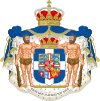 | |
| 2nd generation |
| |
| 3rd generation | ||
| 4th generation | ||
| 5th generation | ||
| *also a princess of Denmark See also House of Glücksburg | ||
- 1906 births
- 1968 deaths
- Burials at the Royal Burial Ground, Frogmore
- Chancellors of the University of Kent
- Companions of the Order of the Crown of India
- Dames Grand Cross of the Order of the British Empire
- Dames Grand Cross of the Royal Victorian Order
- Dames Grand Cross of the Order of St John
- Princesses of Denmark
- Deaths from brain cancer in England
- Duchesses of Kent
- Female admirals
- Grand Crosses of the Order of Beneficence (Greece)
- Grand Crosses of the Order of the Sun of Peru
- Grand Crosses of the Order of the Liberator General San Martin
- Princesses of Greece
- House of Glücksburg (Greece)
- House of Windsor
- Nobility from Athens
- Recipients of the Grand Decoration with Sash for Services to the Republic of Austria
- Royal Navy admirals of World War II
- Wives of British princes
- World War II nurses
- Women's Royal Naval Service officers
- Recipients of the Order of Saint Catherine
